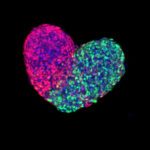Link to Pubmed [PMID] – 36590072
Link to DOI – https://doi.org/10.1016/j.coisb.2022.100435
Curr. Opin. Syst. Biol. 2022 Sep;31:100435.
Models of transcriptional regulation that assume equilibrium binding of transcription factors have been less successful at predicting gene expression from sequence in eukaryotes than in bacteria. This could be due to the non-equilibrium nature of eukaryotic regulation. Unfortunately, the space of possible non-equilibrium mechanisms is vast and predominantly uninteresting. The key question is therefore how this space can be navigated efficiently, to focus on mechanisms and models that are biologically relevant. In this review, we advocate for the normative role of theory—theory that prescribes rather than just describes—in providing such a focus. Theory should expand its remit beyond inferring mechanistic models from data, towards identifying non-equilibrium gene regulatory schemes that may have been evolutionarily selected, despite their energy consumption, because they are precise, reliable, fast, or otherwise outperform regulation at equilibrium. We illustrate our reasoning by toy examples for which we provide simulation code.


